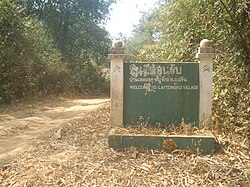Laytongku
Laytongku
เลตองคุ | |
|---|---|
Village | |
 Entrance marker for the village of Laytongku | |
| Country | Thailand |


Laytongku or Lay Tong Ku (Thai: เลตองคุ, RTGS: Letongkhu) in S'gaw Karen: Letawkho, is a Karen village on the south-western tip of Tambon Mae Chan Subdistrict of Umphang District in Thailand's Tak Province and the extreme north-western tip of Kanchanaburi Province. It is located in a valley of the Dawna Range, within the area of Thungyai Naresuan Wildlife Sanctuary and Umphang Wildlife Sanctuary.[1] It is inhabited by an (orthodox) animist Talaku, 'S'gaw Karen', or (Telekhon) Karen Hill Tribe and is the location of the centuries long site of the principal animist shrine (sanctuary) for the Talaku (Telekhon) Karen faith.[2]
Laytongku appeared in the news in 2017 because of an unauthorized removal of an ancient pair of elephant tusks held sacred by the villagers.[2][3]
The village is located on the Thai-Myanmar border along the border of the Karen State of Burma.[4][failed verification]
References
[edit]- ^ Goodden, Christian, Three Pagodas Pass, a journey down the Thai-Burmese border., Jungle Books 2002.
- ^ a b Ancient Carved Tusks Stolen from Karen Village (Laytongku., Bangkok Post, 10 June 2017 17:45, by: Assawan Pinitwong.
- ^ Sacred Tusks Come Home, The Nation, June 13, 2017.
- ^ Police locate centuries old elephant tusks stolen from Karen Village. The Nation, June 11, 2017, pp. 18-24, by Simjit Rungiamrassamee.
